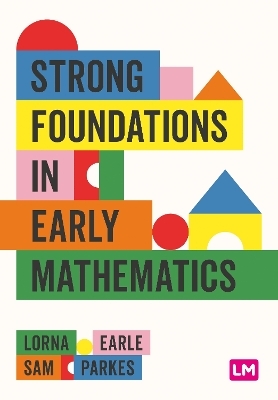
Strong Foundations in Early Mathematics
Learning Matters Ltd (Verlag)
978-1-5297-9120-4 (ISBN)
Lorna Earle is a qualified teacher for both primary and secondary age ranges, who has always specialised in mathematics. Lorna began her teaching career in primary school where she was the maths lead, responsible for developing curriculum provision for all age groups. Lorna is currently a Senior Lecturer in Primary Education specialising and leading in mathematics at the University of Chichester. She teaches on both undergraduate and postgraduate initial teacher training courses. Lorna’s research interests include focusing on the importance of developing conceptual understanding to support formal methods in mathematics and the effective teaching and learning of times tables. Previously allergic to the subject, Sam Parkes became a primary mathematics subject leader during her fourth year of teaching and has gradually fallen in love with the teaching of maths since that point – a 180-degree turn! She is currently a Senior Lecturer and Primary Maths Specialist working as part of the ITE department at the University of Chichester. She teaches on the primary undergraduate and postgraduate programmes, is Deputy Programme Leader for the PGCE (Primary) and works with a wide range of schools to support improvements in maths, with both the University′s Academy Trust and local school partners. Her research interests include collaborative professional development, leading and managing sustainable change and developing inclusive community cultures, advocating for the empowerment and autonomy of teachers across the profession.
Part I: Mathematical landscapes and foundations
Introduction to Part I
Chapter 1: Introduction – Why does early mathematics matter?
Chapter 2: Maths and me – The importance of your relationship with maths
Chapter 3: Developing subject-matter knowledge – Identifying gaps and misconceptions
Part II: Key principles of effective mathematical pedagogy
Introduction to Part II
Chapter 4: The Subject Knowledge Quartet – Outlining a framework for effective support of maths learning
Chapter 5: What’s the point? - Awareness of purpose in mathematical learning
Chapter 6: Where do I start? - Identifying and developing good starting points and examples
Chapter 7: How do I show the maths? - Modelling, demonstrating and the use of resources
Chapter 8: What’s a good question? - Encouraging mathematical talk and developing reasoning
Chapter 9: How do I develop connections? - Linking content and concepts
Chapter 10: What if they ask...? Responding to the unexpected
Chapter 11: Transitions
| Erscheinungsdatum | 27.01.2023 |
|---|---|
| Verlagsort | Exeter |
| Sprache | englisch |
| Maße | 171 x 246 mm |
| Gewicht | 450 g |
| Themenwelt | Schulbuch / Wörterbuch |
| Sozialwissenschaften ► Pädagogik ► Vorschulpädagogik | |
| ISBN-10 | 1-5297-9120-0 / 1529791200 |
| ISBN-13 | 978-1-5297-9120-4 / 9781529791204 |
| Zustand | Neuware |
| Informationen gemäß Produktsicherheitsverordnung (GPSR) | |
| Haben Sie eine Frage zum Produkt? |
aus dem Bereich


